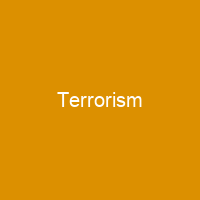Terrorism: The Dark Shadow of Modernity
Imagine a world where fear is not just an emotion but a weapon. Where violence is used to instill terror in the hearts and minds of people, aiming to achieve political or ideological goals. This is the essence of terrorism—a term that has evolved over time, yet remains shrouded in ambiguity.
The Origins and Evolution of Terrorism
Did you know that the terms ‘terrorist’ and ‘terrorism’ originated during the French Revolution? These words gained international attention in the 1970s, marking a pivotal moment in their history. Since then, various organizations have employed these tactics, ranging from left-wing and right-wing groups to nationalist, religious, revolutionary, and even ruling governments.
Defining Terrorism: A Challenging Task
The definition of terrorism is far from straightforward. In 1992, Alex P. Schmid proposed a simple definition for the United Nations Commission on Crime Prevention and Criminal Justice (CCPCJ), but it was not accepted. It’s estimated that there were over 109 different definitions of terrorism in 2006 alone. This lack of consensus highlights the politically charged nature of the term.
Terrorism: A Global Phenomenon
Religious extremism has become the main driver of terrorist attacks worldwide since 9/11, with a five-fold increase in deaths. Groups like Hezbollah and Hamas have been particularly active, drawing inspiration from revolutionary goals and social conditions. The rise of organizations such as the Islamic State of Iraq and the Levant (ISIL) has further complicated the landscape.
State Terrorism: A Controversial Concept
The concept of state terrorism is often controversial, with some arguing that it involves acts committed by governmental agents or forces using state resources for foreign policy. Examples include German bombing of London and US atomic bombings during World War II. However, the term’s vagueness has led to debates over its application.
Understanding the Motivations
Terrorists are often motivated by self-determination claims, ethnonationalist frustrations, or single issue causes. They may choose terrorism as a tactic for various reasons, including asymmetric warfare, intimidation, attention-seeking, propaganda, and attacking ‘collaborators.’ The motivations can be complex and multifaceted.
Counterterrorism Strategies: A Dilemma
Responses to terrorism include re-alignments of the political spectrum, reassessments of fundamental values, and various counterterrorism strategies such as targeted laws, military action, increased intelligence activities, and more permissive interrogation policies. The key is finding a balance between security and civil liberties.
The Media’s Role in Terrorism
The connection between terrorism and the media has been widely studied. James F. Pastor explains that there is always a point at which the terrorist ceases to manipulate the media gestalt, making it an integral part of their strategy. The internet has created new ways for groups to spread their messages, leading to a cycle of measures and countermeasures.
Domestic Terrorism: A Growing Concern
In countries like the United States, domestic terrorism has surpassed jihadist attacks, with a focus on white supremacist and anti-government sentiments. The challenge lies in understanding the motivations behind these acts and addressing them without infringing on civil liberties.
Conclusion: Terrorism’s Persistent Shadow
Terrorism remains one of the most pressing global challenges today. It is a complex issue with no easy solutions, but by understanding its roots, motivations, and impacts, we can work towards a safer future. The fight against terrorism requires a multifaceted approach that balances security measures with respect for human rights.

You want to know more about Terrorism?
This page is based on the article Terrorism published in Wikipedia (retrieved on March 5, 2025) and was automatically summarized using artificial intelligence.





